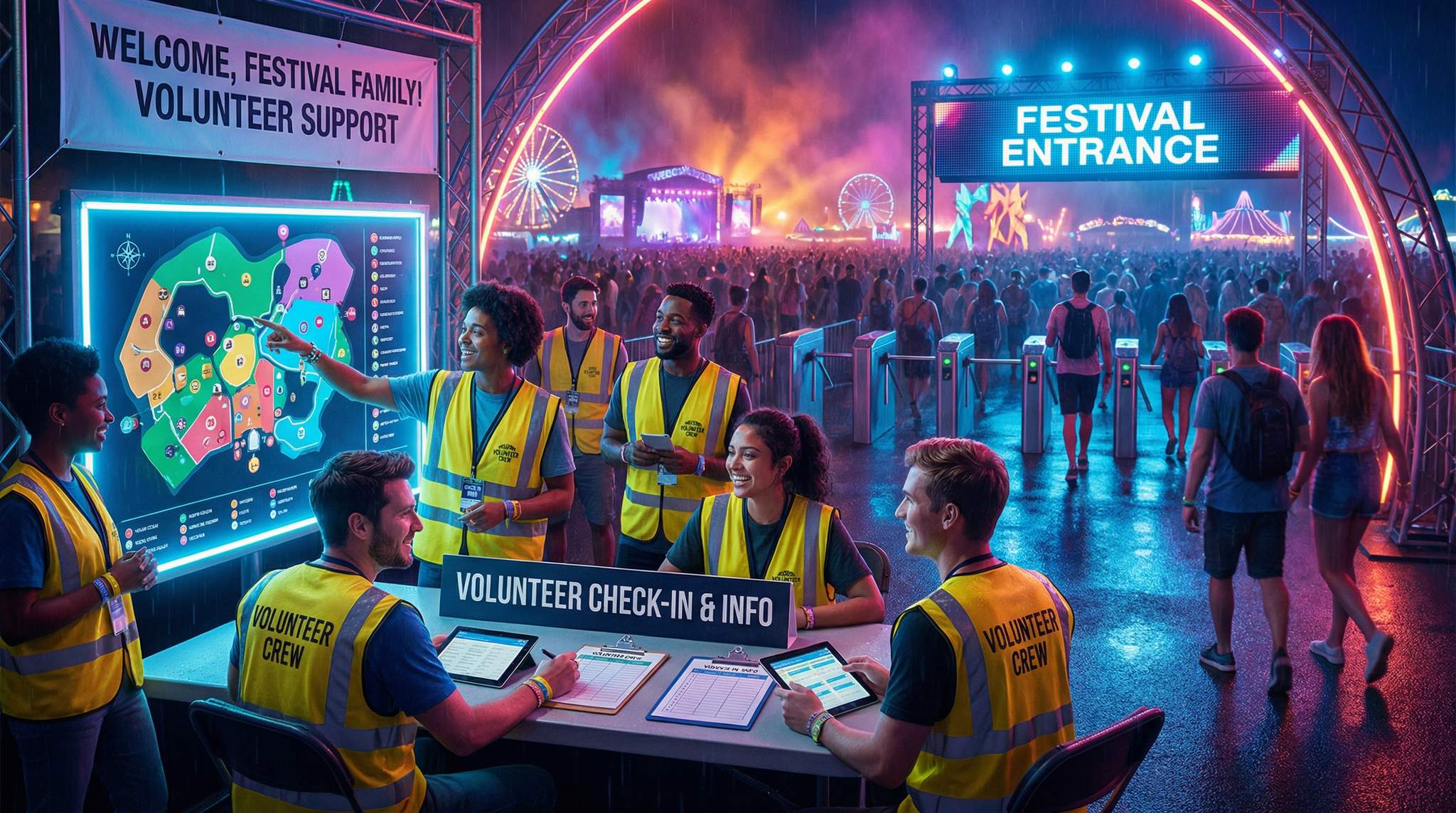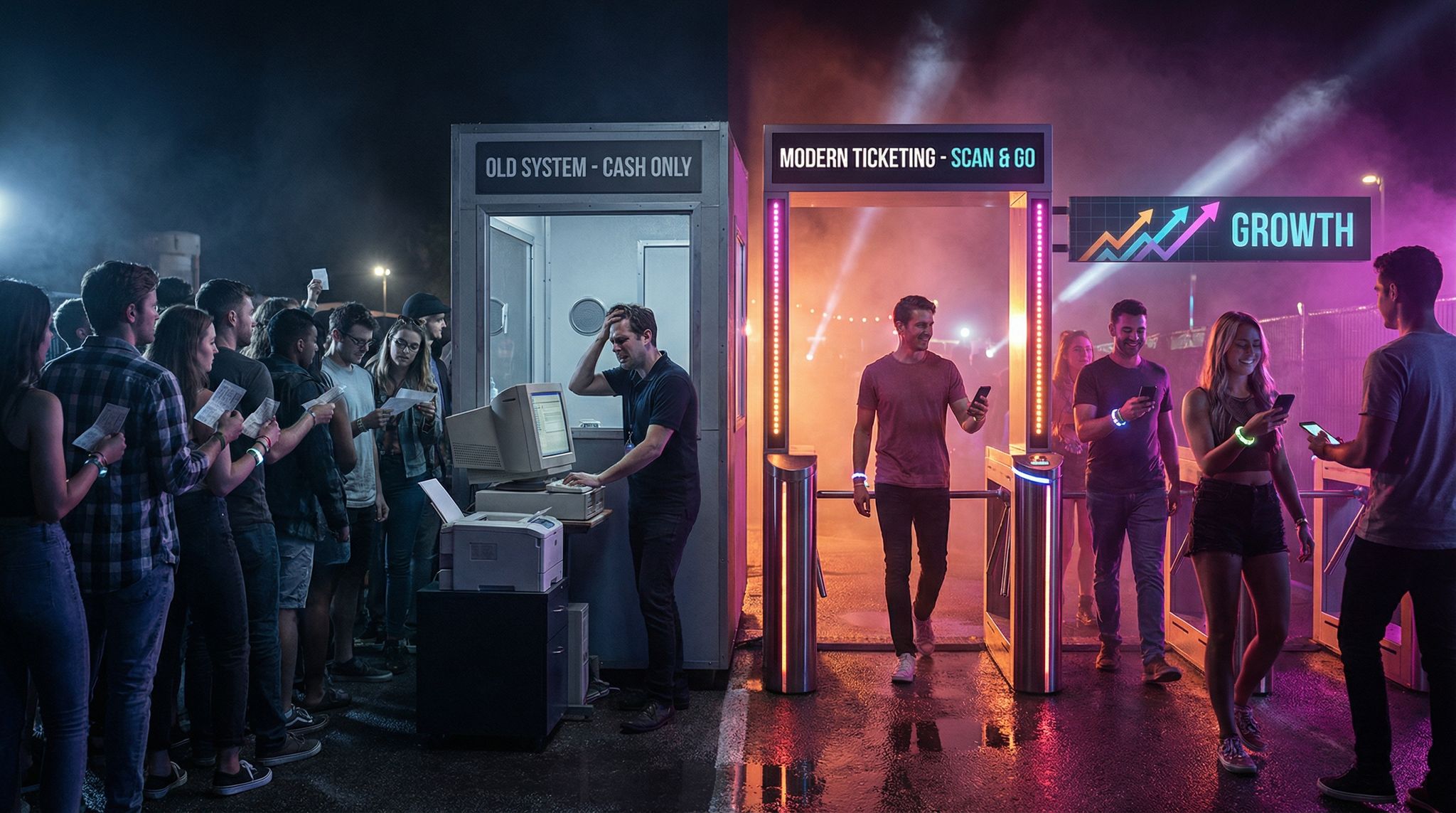Large-scale festivals around the world – whether it’s a mega music festival in England, a massive cultural celebration in India, or an international film festival in Canada – rely on armies of volunteers to run smoothly. These events often recruit hundreds or even thousands of volunteers, making volunteer management a critical part of festival success. For instance, the Sundance Film Festival enlists around 1,400 volunteers from dozens of countries, and charity-led programmes in the UK seek up to 8,500 volunteers in a single festival season. Volunteers are truly the backbone of such events, bringing enthusiasm and community spirit. But managing a volunteer programme at an industrial scale requires careful planning and execution. The following strategies – honed by veteran festival organisers – will help ensure your volunteer team is happy, effective, and eager to return.
Offer Short, Clear Roles with Real Training
The first cornerstone of a successful large-scale volunteer programme is role clarity and proper training. Volunteers perform best when they know exactly what their duties are and have been shown how to do them. Break down festival tasks into well-defined roles – ticket scanner, stagehand assistant, info booth guide, crowd steward, green team recycler, and so on – each with a clear description. By assigning specific, short-term roles, you prevent volunteers from feeling overwhelmed or confused.
Training is essential even if the role seems simple. A brief but thorough orientation can make a world of difference. Many major events require volunteers to attend training sessions or complete online modules before the festival. For example, volunteers at Glastonbury Festival who sign up as stewards through Oxfam receive detailed briefing materials and on-site training to prepare them for handling crowds and safety procedures. This real training ensures that when the gates open, your volunteers are confident and capable. It also helps align them with your event’s values (like sustainability or customer service standards) right from the start.
Make training practical and role-specific: demonstrate how to use any equipment (radios, ticket scanners), outline emergency protocols, and walk through common scenarios they might encounter. Never assume volunteers will “figure it out” on their own – clear guidance not only improves performance but also shows respect for your volunteers’ time and effort. As a bonus, well-trained volunteers are more likely to enjoy their work, since they won’t be left struggling. This sets them up for success and reduces the chance of mistakes or accidents.
Rotate Often and Feed Well
Volunteering at a festival should be rewarding – but it shouldn’t feel like an endurance test. To keep your volunteer workforce motivated and healthy, limit individual shift lengths and rotate assignments when possible. Many experienced festival organisers recommend capping volunteer shifts around 6–8 hours at most, and scheduling ample breaks. In fact, some festivals like Green Man (Wales) even allow volunteers to state their preferred shift times (morning, afternoon, night), then assign 4–6 hour shifts so that each person has plenty of time to rest or enjoy the event when off-duty. This approach prevents burnout and keeps energy levels high. No one should be stuck at a single post all day and night – rotating roles or shift locations can also help volunteers stay engaged and learn new skills.
Take care of your volunteers’ basic needs, especially food and hydration. It’s simple: a fed volunteer is a happy volunteer. Provide meals or hearty snacks and constant access to water. If your budget allows, set up a volunteers’ canteen or arrange food vouchers. Many large festivals build meal breaks into the schedule and supply food as a perk – for example, Sundance Film Festival gives all volunteers meal vouchers to redeem at local eateries, and SXSW in Austin ensures each volunteer gets a meal for every 6-hour shift they work. On the flip side, failure to feed your crew can be disastrous: during the 2016 Rio Olympics, volunteers were asked to work 8–9 hours with only a tiny snack, and many ended up quitting mid-event in protest. The lesson is clear – never neglect volunteer welfare. Budget for sandwiches, rice bowls, or whatever fits your event’s cuisine, but make sure no volunteer runs on an empty stomach.
Planning a Festival?
Ticket Fairy's festival ticketing platform handles multi-day passes, RFID wristbands, and complex festival operations.
In addition to food, consider other support: a backstage chill-out area for volunteers to rest, free coffee/tea stations, and team leaders checking in on their well-being. Simple gestures like providing rain ponchos, sunscreen, or hand warmers depending on conditions can show you truly value their comfort. Remember that volunteers are giving their time for little or no pay – meeting their basic needs is the least an organiser can do. When volunteers feel cared for, they’ll work with a smile and go the extra mile for your festival.
Track Reliability and Promote the Stars
When dealing with hundreds of volunteers, keeping track of who’s doing well (and who isn’t) becomes crucial. Implement a system to monitor attendance, punctuality, and performance. Sign-in/out logs or a volunteer management app can help record if someone skips a shift or consistently arrives late. Post-event, debrief with your volunteer coordinators to identify any no-shows or problem cases, as well as shining stars in the ranks.
For those who underperform or break the rules, have clear consequences. It may sound harsh, but removing unreliable volunteers from your roster is necessary at scale. The Sundance Film Festival’s volunteer department, for example, maintains a “naughty list” – volunteers who misbehave or bail on their duties are noted and not invited back. Many music festivals take a proactive approach by requiring volunteers to pay a refundable deposit (often equal to a ticket price) before the event, which they get back only after completing all their shifts satisfactorily. This deposit system greatly reduces last-minute flakiness because volunteers have skin in the game.
On the positive side, make sure to recognize and “promote” your best volunteers. In a massive crew, there will always be a few stand-outs – the volunteer who jumps in wherever needed, the one who leads others by example, the calm problem-solver, the ultra-reliable team member who shows up early for every shift. These people are gold. Keep notes of exceptional performance and find ways to reward it. For instance, you can elevate proven volunteers to greater responsibility next time: maybe invite them to be a zone leader, a volunteer captain supervising a small team, or a trainee stage manager under staff guidance. Many festival staffers and managers today actually started as volunteers who proved themselves. By creating a pipeline for talent, you not only fill leadership roles with people who know the event, but you also inspire other volunteers to put in their best effort.
Don’t forget external recognition too. Some festivals and communities give out “Volunteer of the Year” awards or public honours to their stars. In Ireland, the Wexford Festival Opera even has an annual Volunteer Award, and one long-time festival steward was celebrated nationally for his contributions. These accolades shine a light on volunteering as a valued profession in its own right. While not every event will have formal awards, simply acknowledging your top contributors by name in communications can motivate everyone. Identify your star volunteers and let them know they’re appreciated and have a future in your festival organisation if they want it.
Thank Volunteers Publicly and Professionally
A hallmark of great festival organisers is how they thank their volunteers. After all, these individuals have given hours of labour purely out of passion or goodwill. It’s critical to show sincere appreciation – both to retain them (more on that next) and because it’s just the right thing to do. Always thank your volunteers publicly and professionally.
Need Festival Funding?
Get the capital you need to book headliners, secure venues, and scale your festival production.
Publicly thanking volunteers can take many forms. During the festival, make occasional shout-outs over the PA or from the stage (“Huge thanks to our volunteer team who make this event possible!”) – a little cheer can goose volunteer pride. Many events also list volunteer names in the programme booklet or on the festival website. Social media is a powerful tool here: consider posting a group photo of the volunteer crew with a heartfelt thank-you message. Highlight stories of individual volunteers (“Meet Sofia, our volunteer who flew in from overseas and spent 20 hours helping recycle – thank you, Sofia!”) to put a human face on their work. The key is to make volunteers feel seen as an integral part of the event’s success, not hidden behind the scenes.
Professional thanks means treating volunteers with the same respect as paid staff. Write a formal thank-you email or letter after the festival, describing what they helped accomplish (e.g. “Over 5000 guests served – we couldn’t have done it without you”). If possible, offer to provide references or certificates documenting their volunteer hours and responsibilities – this costs you nothing and can greatly help volunteers in their careers or education. Many film and arts festivals do this to acknowledge that volunteers gained real event management experience. You might even host a post-event volunteer appreciation party or gathering. For example, the Sundance Festival holds a Volunteer Appreciation Day with exclusive film screenings just for the volunteers, capped by a private volunteer celebration where the party takes place. Similarly, SXSW organisers invite volunteers to special events and publicly thank them on the official website and support pages as essential team members.
However you do it, be genuine in your gratitude. Volunteers can tell if they’re an afterthought or a nuisance; that’s a fast way to lose goodwill. Instead, cultivate an environment where volunteers feel like valued partners. Simple gestures like staff wearing “Thank You Volunteers” buttons, or a slide show of volunteer photos on the big screen between acts, can warm hearts. And always credit them in any post-event reports or media interviews – when festival directors praise “our amazing volunteers” in press articles, it reinforces a culture of appreciation.
Retention Reduces Risk
In the high-stakes world of large festivals, volunteer retention isn’t just a nice bonus – it’s a critical risk management factor. Keeping your volunteers coming back year after year significantly lowers the risks and costs associated with training, recruitment, and on-site operations. Think of returning volunteers as experienced crew members: they know the venue layout, remember the routines from last time, and often require only a refresher rather than full training. This experience means they can handle issues more adeptly and even help guide first-timers.
Loyal volunteers also provide a reliable core to your team. If you treat people well and build a tradition, many will make your festival an annual part of their lives. It’s not uncommon for a well-run festival to have a sizeable percentage of its volunteers return. For example, those charity volunteer programmes at UK festivals often see the same friendly faces signing up summer after summer – some individuals have volunteered at Reading or Glastonbury four, five, even ten times. These veterans become informal mentors on site, showing newcomers the ropes and maintaining institutional knowledge that might otherwise be lost each year.
By contrast, high turnover in your volunteer base can create significant risks. You might end up with a majority of green volunteers unfamiliar with the event, which increases the chance of mistakes or slower response in critical moments. There’s also the scramble of having to recruit and vet a whole new batch of people for every festival edition – not an easy task at scale. Every returning volunteer is one less person you need to recruit anew, and one more person you can count on. It’s telling that many festivals give priority sign-ups or special perks to returning volunteers as an incentive – they know the value of retaining that experience.
So, how do you improve retention? All the points discussed above feed into it: clear roles and good training help volunteers enjoy their work (so they’re willing to do it again), sensible shifts and being well-fed prevent burnout (so they physically can do it again), recognition and respectful treatment build loyalty (so they want to do it again), and growth opportunities give people a reason to stick around (so they see volunteering as personally rewarding). Additionally, soliciting feedback from volunteers after the event and implementing their suggestions shows that you care about their experience. When volunteers feel a sense of community and pride in your festival, they are far more likely to sign up for the next one – and bring their friends along too.
Finally, by nurturing a strong volunteer community, you create a safety net for your festival operations. In tough times (say, sudden staff shortages or emergencies), a loyal volunteer crew can be the difference in pulling off a successful event versus falling short. Retention truly reduces risk by ensuring your event always has an experienced, passionate team to lean on.





